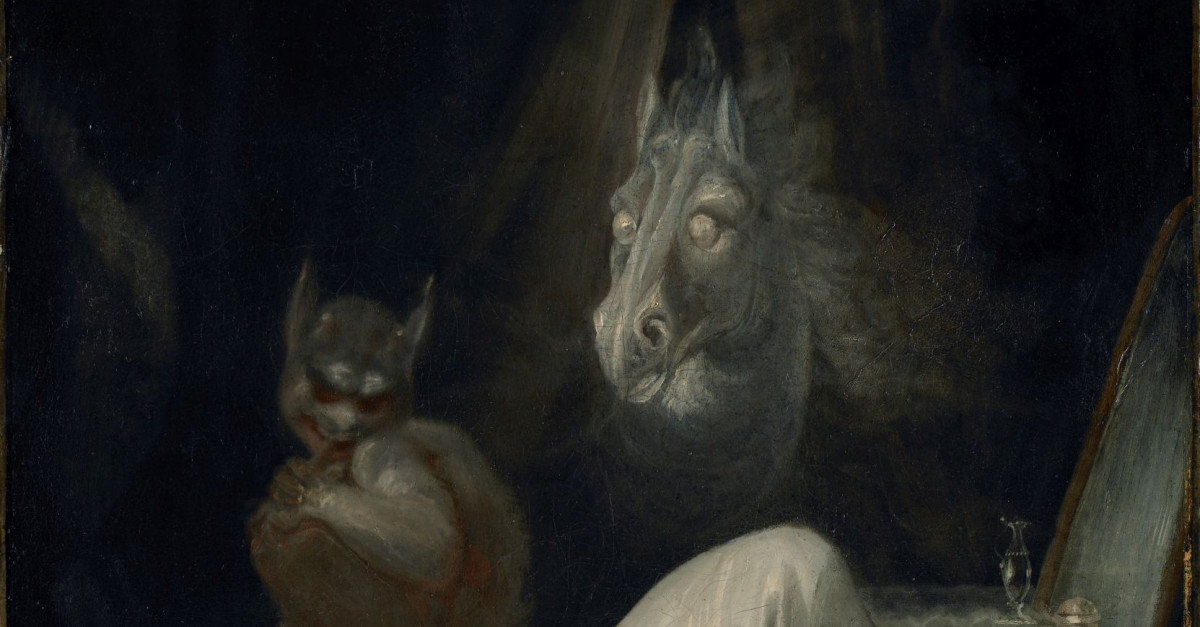In this auspicious occasion, we are delighted to delve into the intriguing topic related to The Enigmatic Allure of Der Nachtmahr Bild: Unveiling its History, Significance, and Value. Let’s weave interesting information and offer fresh perspectives to the readers.
The Enigmatic Allure of Der Nachtmahr Bild: Unveiling its History, Significance, and Value

Introduction
Greetings, fellow art enthusiasts! Today, we embark on a captivating journey into the realm of Der Nachtmahr Bild, an enigmatic and alluring artistic genre that has captivated imaginations for centuries. Join us as we unravel the rich history, delve into the intricate symbolism, and explore the profound impact of these nocturnal masterpieces.
- Der Nachtmahr Bild: A Glimpse into the Darkness

Der Nachtmahr Bild, literally translating to "night-mare picture," is a genre of art that depicts the haunting presence of a nocturnal spirit known as the Nachtmahr. This enigmatic figure, often depicted as a malevolent force, is said to torment sleeping individuals, causing nightmares and sleep paralysis.
- The Origins of Der Nachtmahr Bild
The origins of Der Nachtmahr Bild can be traced back to medieval folklore and mythology. In Germanic and Slavic cultures, the Nachtmahr was believed to be a demon or evil spirit that could shapeshift into various forms, including a horse, dog, or even a human.

- The Nightmarish Visions of Henry Fuseli
One of the most renowned artists associated with Der Nachtmahr Bild is Henry Fuseli, an 18th-century Swiss-English painter. Fuseli’s iconic work, "The Nightmare," depicts a sleeping woman being tormented by a monstrous Nachtmahr, symbolizing the terrors that lurk within the subconscious.

- Symbolism and Interpretation in Der Nachtmahr Bild

Der Nachtmahr Bild often employs powerful symbolism to convey deeper meanings. The Nachtmahr itself represents the fears and anxieties that haunt the human psyche, while the sleeping figure symbolizes vulnerability and the fragility of the human condition.

- The Influence of Romanticism on Der Nachtmahr Bild


The Romantic era of the 19th century witnessed a renewed interest in Der Nachtmahr Bild. Romantic artists, captivated by the themes of the supernatural and the subconscious, used this genre to explore the darker aspects of human nature.
- Der Nachtmahr Bild in Contemporary Art


In contemporary art, Der Nachtmahr Bild continues to inspire and provoke. Artists such as Max Ernst, Salvador Dalí, and Francis Bacon have drawn upon this genre to create haunting and surreal visions that challenge our perceptions of reality.

- The Enduring Legacy of Der Nachtmahr Bild



Through its evocative imagery and profound symbolism, Der Nachtmahr Bild has left an enduring legacy in the world of art. These nocturnal masterpieces continue to captivate and unsettle viewers, reminding us of the ever-present darkness that lurks within the depths of our own minds.
Subheadings
- The Advantages and Disadvantages of Der Nachtmahr Bild
Advantages:
- Emotional Catharsis: Der Nachtmahr Bild can provide an outlet for expressing and confronting deep-seated fears and anxieties.
- Exploration of the Subconscious: These works offer a glimpse into the subconscious mind, allowing us to delve into the hidden realms of our psyche.
- Historical and Cultural Significance: Der Nachtmahr Bild holds historical and cultural value, providing insights into the beliefs and fears of past societies.
Disadvantages:
-
Disturbing Imagery: The often-disturbing imagery in Der Nachtmahr Bild can be unsettling for some viewers.
-
Misinterpretation: The complex symbolism in these works can lead to misinterpretations and misunderstandings.
-
Limited Appeal: Der Nachtmahr Bild may not appeal to all tastes, as it deals with dark and unsettling themes.
-
Summary of Der Nachtmahr Bild
Der Nachtmahr Bild is a genre of art that depicts the haunting presence of the Nachtmahr, a nocturnal spirit believed to torment sleeping individuals. Originating in medieval folklore, this genre gained prominence in the 18th and 19th centuries, with artists such as Henry Fuseli creating iconic masterpieces. Der Nachtmahr Bild employs powerful symbolism to explore fears, anxieties, and the fragility of the human condition. While it offers emotional catharsis and insights into the subconscious, it can also be disturbing and challenging to interpret.
- Q&As on Der Nachtmahr Bild
Q1: What is the purpose of Der Nachtmahr Bild?
A: Der Nachtmahr Bild serves various purposes, including expressing fears, exploring the subconscious, and providing historical insights.
Q2: Who are some famous artists associated with Der Nachtmahr Bild?
A: Henry Fuseli, Max Ernst, Salvador Dalí, and Francis Bacon are among the renowned artists who have created significant works in this genre.
Q3: What is the significance of the Nachtmahr figure in Der Nachtmahr Bild?
A: The Nachtmahr represents the fears, anxieties, and darker aspects of the human psyche that haunt us in the night.
Q4: How does Der Nachtmahr Bild relate to Romanticism?
A: Romanticism embraced the exploration of the supernatural and the subconscious, which led to a renewed interest in Der Nachtmahr Bild.
Q5: What are the key elements of Der Nachtmahr Bild?
A: Haunting imagery, powerful symbolism, and a focus on the darker aspects of human nature are characteristic of Der Nachtmahr Bild.
Conclusion
Der Nachtmahr Bild stands as a testament to the power of art to confront our fears, explore the depths of our subconscious, and provide historical insights. While it may not be for the faint of heart, this genre offers a unique and captivating experience that challenges our perceptions of reality and reminds us of the enduring presence of darkness within us.
Closing Statement
Embrace the enigmatic allure of Der Nachtmahr Bild. Let its haunting visions ignite your imagination, provoke your thoughts, and remind you that even in the darkest of nights, there is always a glimmer of light within us waiting to be discovered.

Closure
Thus, we hope this article has provided valuable insights into The Enigmatic Allure of Der Nachtmahr Bild: Unveiling its History, Significance, and Value. We thank you for taking the time to read this article. See you in our next article!
